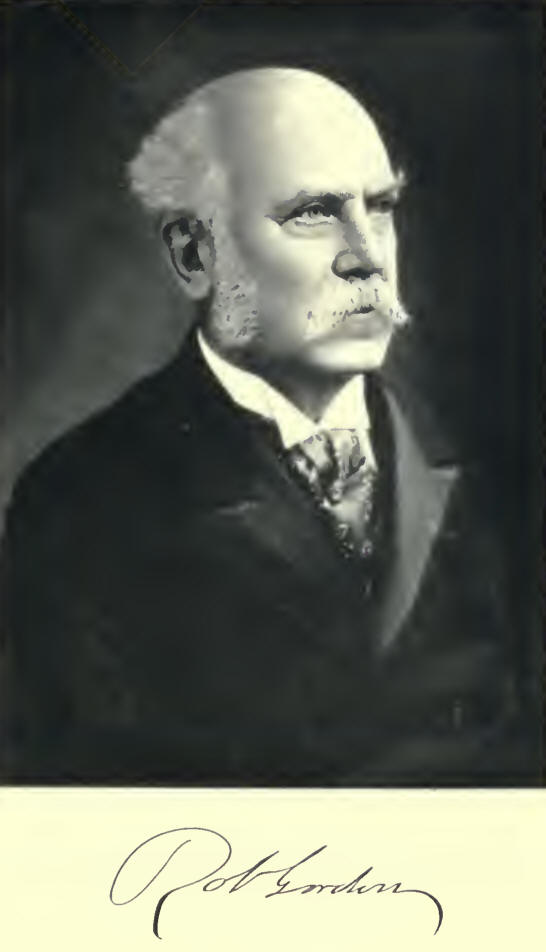|

Twenty-sixth President
1864-1865; 1869-1872; 1873-1876.
The popularity of the
Twenty-sixth President of the Society is attested to by the fact that he
has been thrice elected to that honorable office by his fellow-Scotsmen
in this country.
Robert Gordon is the son
of William Gordon and Sarah Walker, and was born on the 17th November,
1829, at Dumfries, Scotland. He was educated at the Academy in his
native town and commenced his business career in the office of Messrs.
Reid, Irving and Company, of Liverpool, England, in 1846. Three years
later he sailed for America to take a position in the firm of Messrs.
Maitland, Phelps & Company, of New York, a house originally established
by Scotsmen in 1797. Admitted a partner in this firm in 1853, he
remained in active charge of its large and varied interests until 1884,
when, having amassed a fortune in the course of his successful business
career, Mr. Gordon returned to England, with the intention of retiring
from active commercial life.
On reaching England,
however, he was sought out by Mr. J. S. Morgan, head of the firm of J.
S. Morgan & Co., and invited to become a member of this well-known
banking house. After some deliberation Mr. Gordon accepted the offer,
and, entering the firm on the 1st January, 1885, for the next fifteen
years was actively associated in financial affairs with the late Mr. J.
S. Morgan, Mr. Walter H. Burns, Mr. J. Pierpont Morgan, Mr. J. Pierpont
Morgan, Jr., and Mr. Walter S. H. Burns, all well and widely known as
prominent and successful bankers. On attaining his seventieth year,
however, Mr. Gordon decided to finally withdraw from business life, and
his retirement was announced in April, 1900, much to the regret of his
many business friends and associates.
His long and upright
career, both in New York and London, has won for him a well-deserved
repose in the autumn of his life, and he has now retired to his country
place at Brockham Park, Betchworth, England.
During his stay in this
country, Mr. Gordon was interested and active in many educational,
religious and social associations, to all of which he proved an able
administrator and a generous patron. He was a founder of the
Metropolitan Museum of Art, of which lie acted as Treasurer for some
years, and is a member of the Century Association and the Junior Carlton
Club of London.
He was elected a member
of Saint Andrew’s Society on the 30th November, 1852, and became a life
member in 1864. He served as a Manager from 1856-1859; as Second
Vice-President, 1859-1864; and as President, 1864-1865, 1869-1872, and
1873-1876. He long acted as Treasurer of the Centennial Fund, and it was
largely owing to his enterprise and foresight that this fund was created
and kept alive.
From his first
association with the Society Mr. Gordon gave it his best interest and
devoted much time to the duties and cares of the important offices held
by him. His many subscriptions to the charitable funds evidence a spirit
as kindly as it was generous, and under his wise guidance the Scottish
poor of this city were amply provided for and the utility of the Society
materially increased.
Long after his final
departure from this country Mr. Gordon continued to keep in touch with
the work of the association, and in 1898 donated the liberal sum of
$5,000 to its Permanent Fund, thereby being able in the course of his
lifetime to see his good works applied to the relief of his less
fortunate fellow-countrymen.
The success of his
business and social career in this city and abroad was due to a most
agreeable personality, coupled with a strict sense of justice, keen
insight and sound judgment of men and morals. His administrative and
executive ability was marked and caused him to be much sought after by
those associations and institutions which dealt with the ethical
problems of a great city.
Mr. Gordon married on the
19th April, 1855, at Staten Island, N. Y., Frances Burton, daughter of
George Burton and Frances Robinson, and had issue: (1) Frances Eleanor;
(2) William Gordon; (3) Henry Alexander; (4) Mary Tinker; (5) Lilian
Spencer; (6) Diana Etherington.
His portrait is
reproduced from an excellent photograph which is now in the possession
of the Society. |

